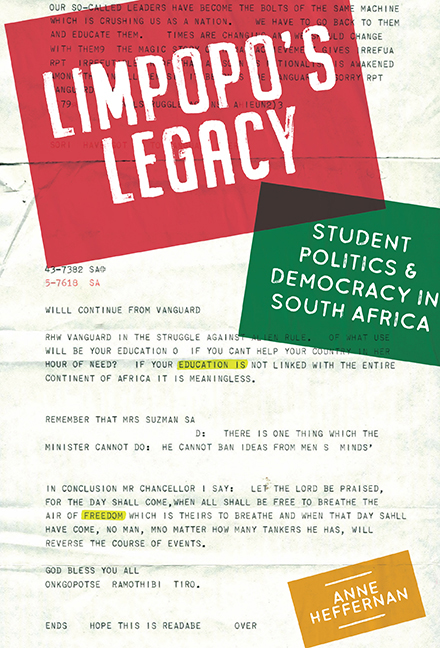Book contents
- Frontmatter
- Dedication
- Contents
- Acknowledgements
- Abbreviations and Acronyms
- Map of the north-eastern Bantustans showing the location of Limpopo
- Introduction
- 1 Turfloop, Crucible of Change
- 2 Centre of the Storm
- 3 Africanization: The New Face of Turfloop
- 4 Black Consciousness in Decline
- 5 Congresses and Comrades
- 6 Populism and the New Youth League
- 7 Julius Malema and Youth Politics in the New Limpopo
- Epilogue: Legacies of Limpopo
- Bibliography
- Index
- Frontmatter
- Dedication
- Contents
- Acknowledgements
- Abbreviations and Acronyms
- Map of the north-eastern Bantustans showing the location of Limpopo
- Introduction
- 1 Turfloop, Crucible of Change
- 2 Centre of the Storm
- 3 Africanization: The New Face of Turfloop
- 4 Black Consciousness in Decline
- 5 Congresses and Comrades
- 6 Populism and the New Youth League
- 7 Julius Malema and Youth Politics in the New Limpopo
- Epilogue: Legacies of Limpopo
- Bibliography
- Index
Summary
By the early 1970s the University of the North at Turfloop was growing increasingly prominent as a centre of student resistance against the apartheid state, or ‘the system’ as student activists called it. This was due in large part to a number of high-profile student activists who had cut their political teeth with campus groups like the South African Students’ Organization, the Students’ Christian Movement, and the earlier University Christian Movement, as discussed in the previous chapter. For these individuals, and for the majority of the student body of Turfloop, Christianity and political resistance to the system went hand in hand. These activists also served an important role in representing Turfloop, and the radical politics that had developed on campus, to the rest of South Africa and to other student and political activists in the antiapartheid cause.
These developments occurred against a backdrop of changes in the way that protest politics were being enacted throughout South Africa. In his recent book The Road to Soweto, Julian Brown explores these changes and argues that the decade preceding the 1976 Soweto Uprising was marked by increasingly confrontational forms of politics. He contends that the shift towards confrontational protest originated on white university campuses in 1966 and 1968; he points to the aftermath of Tiro's expulsion in 1972 as the first move towards such confrontation on black campuses, and the Viva-FRELIMO rallies of 1974, one of which was held at Turfloop, as the culmination of this trend at black universities. Building on Brown, who is primarily concerned with the form of these protests and linking them to national trends, this chapter situates them in the context of life and campus politics at Turfloop. It seeks to understand the ways in which student protests on campus came to incorporate broader political concerns around national liberation, and argues for their impact on developing ideas of nationalism and African solidarity that influenced political developments far beyond Turfloop itself.
This chapter considers Turfloop's increasingly prominent place as a centre of student activism, SASO's growing organizational capacity and public profile, and how these two phenomena interacted with one another. It centres on the stories of prominent activists, the roles they played both at and outside of Turfloop, and their importance in South African student politics in the middle of the 1970s – perhaps the most important period of student activism in the country's history.
- Type
- Chapter
- Information
- Limpopo's LegacyStudent Politics & Democracy in South Africa, pp. 67 - 110Publisher: Boydell & BrewerPrint publication year: 2019



